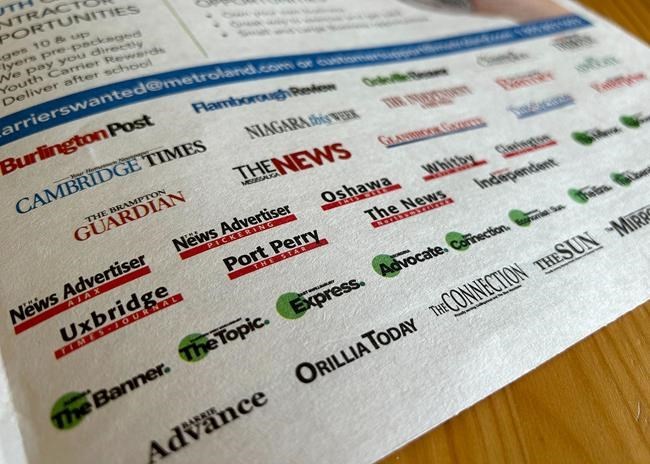TORONTO ŌĆö Large swaths of Ontario will lose their local newspapers as one of the country's largest media conglomerates ends print editions for its community news titles.
Metroland Media Group announced the move to a digital-only model and an end to its flyer business Friday as it revealed it will seek protection and attempt a restructuring under the Bankruptcy and Insolvency Act.
The cuts and restructuring will mean the loss of 605 jobs or about 60 per cent of Metroland's total workforce.┬Ā
Staff at Metroland's six daily newspapers ŌĆö the Hamilton Spectator, Peterborough Examiner, St. Catharines Standard, Niagara Falls Review, Welland Tribune, and the Waterloo Region Record ŌĆö will not be affected, nor will those at the Toronto Star, one of Metroland parent company's NordStar Capital Inc.'s papers.
Metroland attributed the changes to "unsustainable financial losses stemming from the changing preferences of consumers and advertisers."
"The media industry continues to face existential challenges, largely because digital tech giants have used their dominant positions to take the vast majority of the advertising revenue in sa╣·╝╩┤½├Į," the company said in a statement.
"The decline of the print and flyer distribution business was significantly accelerated by the COVID-19 pandemic, and by the reduction of flyer usage both by readers and advertisers as a marketing vehicle."
Metroland's cuts follow years of consolidation across sa╣·╝╩┤½├Į's media industry, which has become synonymous with layoffs and shuttered publications.┬Ā
Many have blamed the rise of tech companies, which have swallowed up advertising dollars, and the surge in online classifieds for the demise in several publications.
The federal government has said Google and Meta, which owns Facebook, Instagram and WhatsApp, had a combined 80 per cent share of the $14 billion online ad revenues seen in the country in 2022.
It has also said some 474 Canadian news businesses closed between 2008 and 2023.
Unifor, sa╣·╝╩┤½├Į's largest private sector union which represents 104 of the workers whose employment is ending, said 70 titles were impacted by Metroland's Friday cut and staff who had taken a voluntary departure saw their severance payments end that day.
"This is devastating. Devastating for these media workers. Devastating for local news. Devastating for the communities who depend on that local news and devastating for the fabric of our democracy," Lana Payne, Unifor's national president, said in a statement.
"The horrible irony of this announcement happening on World Democracy Day only deepens our awareness of what this loss will mean. As a former journalist myself, it's days like these that weigh heavy on my heart and mind."
Metroland's announcement comes as the union and company have been engaging in discussions to merge 13 collective agreements into one agreement with concessions designed to help keep the business running, Unifor said.
Paul Deegan, president and chief executive of industry group News Media sa╣·╝╩┤½├Į, said "there are no easy answers" to the sector's problems.┬Ā
He used Metroland's cuts as an opportunity to call on parliament and the business community to do more to back local journalism.
The federal government, he said, could make the Canadian Journalism Labour Tax Credit more effective by increasing it from 25 per cent to 35 per cent and increasing the salary cap.
"Governments and businesses can support journalism by directing 25 per cent of their advertising spend to private sector domestic news publishers, rather than buying ads from foreign web giants," he added in an email.
NordStar owner Jordan Bitove made a similar plea for 20 per cent of advertising budgets to be directed to homegrown media at a Canadian Club luncheon in March.
Bitove and then-business partner Paul Rivett purchased Torstar Corp. from the five families that built and grew the media conglomerate for roughly 70 years in 2020 for about $60 million.
The partners eventually split the business with Rivett saying their relationship had suffered "irreparable" damage and they could no longer work together.
With Metroland and several other newspapers and subsidiaries in Bitove's hands, NordStar and rival media company Postmedia began pursuing a potential merger.
But by July, both parties were unable to reach an agreement and merger talks were off.
Amid their discussions, Ottawa passed the Online News Act, which will force digital giants to pay media outlets for content they share or repurpose on their platforms.
Meta and Google responded to the legislation by announcing they will block content from Canadian news publishers from their services before the law comes into force.┬Ā
This report by The Canadian Press was first published Sept. 15, 2023.
ŌĆö
Torstar holds an investment in The Canadian Press as part of a joint agreement with subsidiaries of The Globe and Mail and Montreal's La Presse.
The Canadian Press



